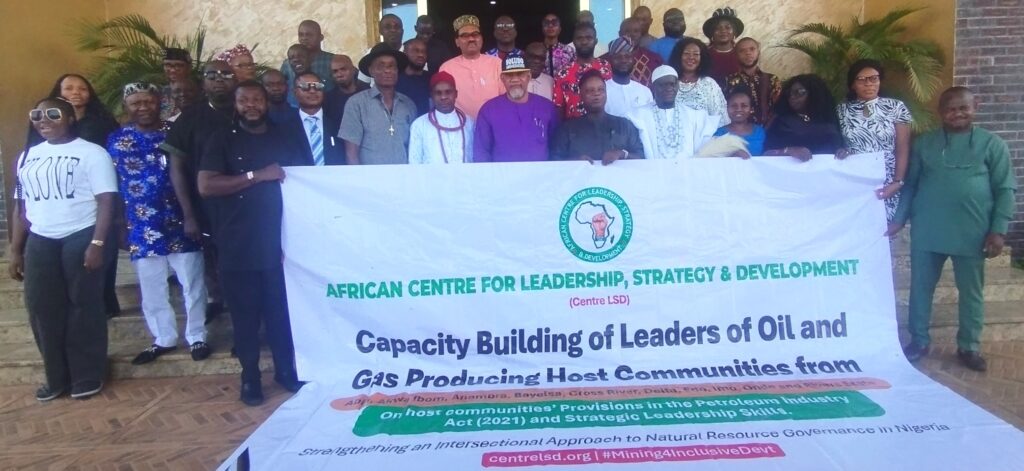By Foster Akpore
The African Centre for Leadership, Strategy and Development (Centre LSD) has commenced a two-day capacity-building session for leaders of oil and gas-producing host communities in the Niger Delta and Southeast geopolitical zones of Nigeria, under the project, “Strengthening Inter-sectional Approach to Natural Resource Governance in Nigeria”. The sessions are being held at Vertex View Hotel and Suite in Awka, the capital of Anambra State, from Thursday, June 26 to Friday, June 27, 2024.

In his opening remarks, the Executive Director of Centre LSD, Mr. Monday Osasah, outlined the objectives of the training. These include equipping leaders with a comprehensive understanding of the Host Communities Provision in the Petroleum Industry Act (PIA), empowering them with strategic leadership skills to engage effectively with International Oil Companies (IOCs) and stakeholders, enhancing their capacity to facilitate sustainable development, and fostering collaboration for the successful implementation of the PIA.
The Honorable Commissioner for Petroleum and Mineral Resources, Anambra State, Barr. Anthony Ikechukwu Ifeanya, welcomed attendees to the forum, addressing historical challenges in the Niger Delta since 1958, particularly issues of trust and transparency. He highlighted past efforts to bridge communities and oil companies, leading to the PIA 2021. While acknowledging the Act’s limitations, he expressed concerns about increasing bunkering activities and the slow implementation of the Host Community Trust Fund in Anambra State.
The Commissioner stressed the need for confidence-building between operators, the state, and communities, and highlighted the governor’s commitment to infrastructure development. He emphasized mutual trust, transparency, and environmentally sustainable operations as crucial for resolving historical grievances and ensuring beneficial outcomes. He concluded by urging full implementation of the PIA and related development initiatives.
Mr. Vincent Dania, Programme Coordinator of Centre LSD, facilitated a session on the Host Communities Provision in the PIA. He noted that while the Act grants significant powers to the settlors, making them responsible for numerous aspects, it is understandable that those providing funds should have a say in their allocation.
He explained that the PIA abolished three agencies—the Department of Petroleum Resources (DPR), the Petroleum Products Pricing Regulatory Agency (PPPRA), and the Petroleum Equalization Fund (PEF)—and removed regulatory powers from the Nigerian National Petroleum Corporation (NNPC). These changes led to the establishment of the Nigerian Midstream and Downstream Petroleum Regulatory Authority (NMDPRA) and the Nigerian Upstream Petroleum Regulatory Commission (NUPRC), which ensures compliance and fair distribution of benefits, fostering sustainable development and cooperation..
The Host Communities Provision in the PIA aims to benefit communities where petroleum operations occur. Key points include a 3% equity share for host communities, the creation of a Host Community Trust Fund managed by a Board of Trustees comprising community, government, and oil company representatives, and the use of funds for infrastructure, education, healthcare, and other projects.
Dr. Itia Itabor, Director of Strategy at Centre LSD, in his session on Strategic Leadership Skills, emphasized the critical role of strategic leadership in community development and organizational success. He highlighted the need for leaders to continuously develop and effectively deploy strategic leadership skills to achieve sustainable results.
Key functions of strategic leadership, according to Dr. Itabor include setting direction, aligning forces, and mobilizing stakeholders. Itabor stressed the importance of communication, listening, commitment, collaboration, honesty, diplomacy, empathy, and humility.
Participants in the sessions included top government officials, traditional leaders, women leaders, youth leaders, and members of host communities. The training employed adult learning methodologies, including open forums, question-and-answer sessions, group work, and networking opportunities, allowing participants to leverage existing skills and capacities to advance their communities’ fortunes.
